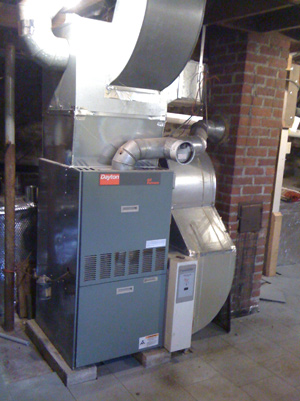Common Types of Heating Systems

Major energy consumption. Heating and cooling account for almost half of a typical home’s total energy expenses. The most effective way to cut heating expenses is to combine a high-efficiency HVAC system with high levels of air sealing, insulation and duct sealing.
There are many types of heating systems that can keep your home warm during winter. Review the descriptions below to determine which kind you have. Dr. Energy Saver can evaluate your system and suggest ways it can be improved for better performance and energy savings.
These brief descriptions will give you a basic idea of how different heating and air conditioning systems work. Keep in mind that some heating and air conditioning systems perform better in certain climates than they do in others.
Dr. Energy Saver will evaluate your system during our Home Energy Audit and give you the details on how it can be improved for better performance and energy savings.
Our heating systems include:
- Forced-air heating systems (aka furnaces) burn fossil fuel (oil or gas) to heat the air. A central fan blows this air through supply ductwork to distribute it throughout your living space. Return ductwork delivers air back to the unit to be reheated and redistributed. Forced air heating is affordable and offers the advantage of a ductwork system that can also be used for central air conditioning.
- Hydro-air is a variation on forced-air heating. A boiler (gas or oil-fired) heats water that is then pumped through a heat exchanger or coil mounted in your ductwork. Air passes through the coil to pick up heat before it's distributed throughout the home. The boiler in a hydro-air system often does double duty, heating water for washing as well as for heating. This eliminates the need for a separate water heater.
- Hot water baseboard heat also relies on a boiler to heat water. The hot water gets pumped to baseboard or other types of radiators that are mounted on the wall. This type of heating system requires no ductwork, which is both good (no leaky ducts to worry about) and bad (no distribution system for central air conditioning).
- An air-source heat pump is a central air conditioner that can run in "reverse," supplying hot air in the winter and cool air in the summer. If you're ever waved your hand over your AC unit outside on a hot day while it's cooling your house, you probably noticed the outdoor unit was blowing hot air. During cold weather, this cycle can be reversed to move this heat into the house.
- A geothermal or ground-source heat pump works like its cousin, the air source heat pump, with one major distinction: It relies on the earth's ground energy to either dump its heat (summer) or pick it up (winter). Because the earth's temperature remains about the same (55-65 degrees Fahrenheit) 6-12 feet below the surface, this type of heat pump performs efficiently in all climates.
- Combi systems supply hot water for heating and also for bathing and washing. Typically compact and very energy efficient, these systems are popular in Europe where energy costs are very high, and space is at a premium. Combi systems burn fossil fuel, and usually can supply virtually any form of hydronic heating application.
- Radiant floor heat puts the warmth under your feet. Warm water from a boiler is pumped through tubing installed beneath the finished floor surface. The flooring material is heated, and acts like a giant radiator, warming objects rather than the air. This type of heating system is comfortable and energy efficient.
- Hybrid heating systems: By combining an air source heat pump with a fossil fuel furnace, this system gives you the flexibility to use the most cost effective fuel at any given time or temperature. In addition, you get built-in redundancy so that if one system isn't working correctly, the other can take over. Controls are automated so there's nothing for you to do once you have programmed the thermostat, besides the enjoyment of unmatched comfort and energy savings.
Dr. Energy Saver will choose the right system for your home
With so many heating options available, it's important to talk to the professionals at Dr. Energy Saver to make sure your heating is optimized for your home. Contact your local dealer today and schedule a home energy audit! We'll help you install a heating system that will keep you warm and save you money for years to come.
Looking for a price? Get a no cost, no obligation free estimate.

